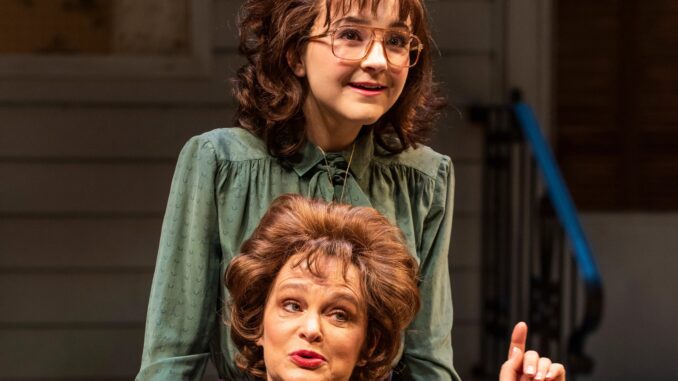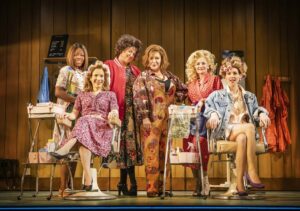
An absolutely perfect Steel Magnolias at Drury Lane
I have some history with Robert Harling’s Steel Magnolias. Besides loving the brilliantly cast 1989 movie (Sally Field, Julia Roberts, Shirley MacLaine, Dolly Parton, Olympia Dukakis, Darryl Hannah…what could be more perfect?), I also directed it on a high school stage in 1998 featuring two casts of high school actors. So it would be a total understatement to say that I enjoy this play full of laser-sharp quips from wonderfully drawn characters gathered in a Lousiana hair salon…and a powerfully poignant, though not unexpected, ending. I can’t even begin to tell you how excited I was that Drury Lane Theatre was putting it on; it took about two seconds to return my RSVP.
It barely took that long for me to know that this production was going to be something truly special.
Angela Weber Miller’s set, the first thing I saw, was enormous and exciting. She not only rendered the salon beautifully, but managed to evoke the house around it—the salon is located in a converted carport—and even the southern sky and the moss-covered foliage surrounding it. We even get glimpses of other spaces both in and out of the house: a kitchen, an entryway, a front porch. This is a fully developed, lived-in space, and that’s perfect for a story about a group of old friends and neighbors who come together in the salon to get their hair done and chat. It’s a space to which these women belong.
Director Johanna McKenzie Miller not only had this gift from the set-design gods to work on, but she ended up with such a stellar cast that I could almost forget that perfect film group. This exquisite ensemble’s performance of Harling’s meticulously crafted script (based on real events that happened to his family in his hometown of Natchitoches, Louisiana, here renamed Chinquapin) keeps the audience in the large theatre laughing loudly until they cry, both of which will happen in this play.
The play takes place in the 80s in Truvy’s Beauty Salon. Truvy (Elizabeth Ledo) is a joyful, happy Southern woman who is excited to have made her little shop into the most successful one in town. Ledo’s enjoyable energy helps us to see why women in the town would come here: her Truvy is a gem. She genuinely cares about these people and their hair. And Ledo reinforces again and again that Trucy loves helping people as well. When the play opens, she has just hired a new stylist, Annelle (Lillian Castillo), who is thankful for a job and desperate to please her new boss and clients. One of Harling’s strengths is the backstories of his characters; Annelle is the new girl in town, unlike the rest who have known each other forever, and she has a history she is reluctant to share…which of course is irresistible to this gossipy group of friends. It’s easy to see how much she is starved for friendship…which helps to explain why she throws herself so manically into this job and so fully into her new church that it pretty much takes over her life. Thanks to Castillo’s warmth, though, she never becomes a caricature; we know that her actions, though designed to make us laugh, are utterly sincere.

This particular day is the wedding day of Shelby (Cordelia Dewdney), the daughter of M’Lynn (Amy J. Carle), one of Truvy’s good friends and regular customers. Everyone is congregating at Truvy’s to get ready for the big event, including Clairee (Susie McMonagle) and Ouiser Boudreaux (the indomitable Janet Ulrich Brooks). These two older women have a long-standing friendship that has been built on the foundation of wealth—each one is richer than God—and teasing, insulting banter. Clairee is the recent widow of the town’s mayor and soon-to-be owner of her own radio station. She is a woman accustomed to being in society and her husband’s death has made her a “third wheel,” so she’s looking for more to do than go to local football games when she hears about the station being offered for sale. McMonagle’s regal air and perfect costumes (Jessica Pabst really comes through for everyone here) almost belie her role in this mostly down-to-earth group, but it soon becomes clear why Clairee likes these women: they are just plain fun, and they keep her grounded.
Ouiser could not be more different from her friend, which is clear from Brooks’ first entrance. She may be filthy rich, but her clothing is plain and unornamented. (It’s even hard for her to wear a gift scarf later in the show.) She’s the kind of woman who can—and will—face down a neighbor she believes is stealing blossoms from her magnolia tree even if he is taking them for his daughter’s wedding. Other than her unlikely friendship with these women, the only relationship she has is with her dog. Brooks’ gruff, no-nonsense demeanor is perhaps even better than MacLaine’s portrayal (which received several award nominations). Ouiser doesn’t really “fit” in this group, but then again she doesn’t fit anywhere; they all love her just the same.
It quickly becomes clear, though, that the most consequential relationship here is between serious-minded M’Lynn, who works every day with mentally-impaired adults, her two sons, her husband Drum—doesn’t that very name say enough?—and her willful daughter Shelby. Carle and Dewdney have clearly focused on this family dynamic; you can almost see the verbal sparring and double meanings when they speak, as well as the real love they have for each other. Today’s argument, which has been ongoing, has to do with whether the fragile and diabetic Shelby and her husband-to-be Jackson should have children (which would go against her doctor’s advice). No matter how much they argue, though, M’Lynn is always there to support Shelby, as she does here when Shelby experiences a seizure. The fact that everyone jumps up to help further reminds us of the long-standing emotional connections among these women. They are all family: Shelby is a daughter to them all.
Dewdney is perfect for all of her character’s many moods. The many pinks in her wardrobe (thanks once more to Pabst, who has wonderful fun with what Shelby calls her “signature colors” of Blush and Bashful but M’Lynn derides as “pink and pink”) help define her as the youngest and most willfully “feminine” of these women, but it is Dewdney herself who shows Shelby off behind her very expressive face. And the relationship with M’Lynn is of such importance that Shelby doesn’t even notice any irony when she proclaims, in a later scene, that she can’t understand mothers and their children fighting.
Director Miller has clearly worked with her actors to create these bonds with their characters. All six of them (including Castillo once her character has time to become part of this group) clearly are fond of each other (even if Annelle’s religious conversion and Ouiser’s…well…offputting personality sometimes drive them crazy). The depth of their love and caring is such that you can almost imagine any one of them delivering the heartfelt speech about maternal bonding and the pain that comes with the joy that Carle gives, literally falling to the floor, at the end. It would be appropriate for them all even those without children.
Design kudos are also due for the lighting (Lindsey Lyddan finds varying combinations that manage to evoke both seasons and times of day), sound (Sarah Ramos is excellent both for effects like gunshots and music, both background and between scenes, not to mention keeping all of the voices clear and crisp), properties (Cassy Schillo’s set decoration and wonderfully wacky Christmas tree are beyond great), dialect (Sammi Grant’s work is evident any time any character opens her mouth), and hair and wigs (which perhaps should be obvious given the setting, but Emily Young’s work makes all of this completely believable). The director and her cast were fortunate to have all of these people behind them, as well as Artistic Director Matthew D. Carney, who clearly recognized that this show needed an all-female team and assembled an excellent one.
I don’t know what kind of person would not love this production. Seriously, it’s that good. Tickets can be purchased from Drury Lane; performances run through August 7.
